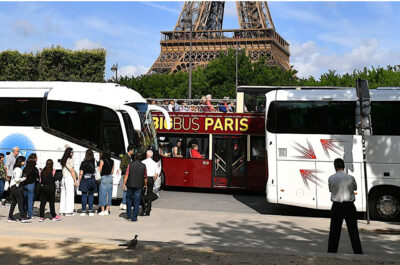The SES 2 + initiative looks to head off a capacity crunch as the number of flights is forecast to increase by 50% over the next 20 years. Inefficiencies in Europe's fragmented airspace bring extra costs of close to 5 billion Euros each year to airlines and their customers.
The Commission welcomed vote in the European Parliament to support, strengthen and push forward the Single European Sky 2+ (SES 2+) initiative as a key move to accelerate the implementation of Single European Sky.
Commission Vice-President Siim Kallas, responsible for transport, said: “The Single European Sky initiative is crucial to boost competitiveness in the aviation sector, create jobs, and contribute to the European economy’s growth. Today’s vote in the Parliament gives a boost to the entire project. It is now up to the Member States to take this important issue forward, and deliver a truly efficient air traffic system in Europe”.
The SES 2 + initiative looks to head off a capacity crunch as the number of flights is forecast to increase by 50% over the next 20 years. Inefficiencies in Europe’s fragmented airspace bring extra costs of close to 5 billion Euros each year to airlines and their customers. They add 42 kilometres to the distance of an average flight forcing aircraft to burn more fuel, generate more emissions, pay more in costly user charges and suffer greater delays. The United States controls the same amount of airspace, with more traffic, at almost half the cost.
With full implementation of the SES potential annual savings are calculated to be in the order of 2.9 billion euros per year for airlines, with a reduction of emissions by 2.4 million tonnes of CO2. This will boost competitiveness and growth in the sector.
With the SES2+ the Commission proposed to update the four regulations creating the Single European Sky (SES), and amend rules governing the European Aviation Safety Agency (EASA). Key elements of the proposal include:
- Better safety and oversight. Safety remains the first priority for aviation. EASA audits have shown great deficiencies in the oversight of air traffic control organisations in the Member States. The Commission proposed full organisational and budgetary separation of national supervisory authorities from the air traffic control organisations whom they oversee, while at the same time ensuring sufficient resources are given to the National Supervisory Authorities to do their tasks.
- Better Air Traffic Management Performance. The reform of Europe’s air traffic management system is driven by four key performance targets: safety, cost-efficiency, capacity and environment. These targets go to the heart of the reform process as they require air traffic control organisations to change and provide better services at lower cost. The Commission proposed to set targets in a more independent manner.
- New business opportunities in support services. The Commission proposed to open up new business opportunities for companies to provide support services to air traffic control organisations.
- Enabling industrial partnerships. Functional Airspace blocks (FABs) are intended to replace the current patchwork of 27 national air traffic blocks with a network of larger, regional blocks to gain efficiency, cut costs and reduce emissions. The Commission proposed to build upon industry’s initiatives to support the creation of FABs.
ECTAA calls on the European Parliament to close the gaps in consumer protection legislation
ECTAA calls on the European Parliament to take into account the concerns echoed by the industry and consumers. ECTAA is concerned that the European Parliament’s amendments will fall short of the objective of the revision to ensure that all consumers benefit from protection irrespective of whether they buy a traditional pre-arranged package or a combination of travel services put together in a customized form from one or multiple traders.
ECTAA regrets that the European Parliament puts the industry’s and consumers’ interests at risk with its report. The scope of the Directive should include combinations of travel services sold by transport providers (low cost air carriers for instance). Under the current report, those companies will be able to sell combined services as if they were separate whereas smaller stationary travel agents or tour operators, when selling the same products, will be under more protective, yet more stringent and costly, rules.
This report is therefore about to fail at ensuring a level playing field and better consumer protection. ECTAA would favour the adoption of a more balanced text, ensuring the competitiveness of the European travel industry.
Said ECTAA President, Boris Zgomba: “The Package Travel Directive is a well-functioning piece of legislation ensuring a high level of consumer protection. The main goal of this revision should be to put all market players under the same level of obligations. This will not be the case if the Parliament votes in the proposed amendments. Price driven consumers will remain unprotected when buying a combination of travel services on Low Cost Carriers’ websites whereas traditional Travel Agents and Tour Operators will suffer from increased obligations. This is not proportionate”.
HOTREC, the business association representing the European hospitality industry, considers the adoption by the European Parliament plenary of its resolution on the new Package Travel Directive as a positive development for tourism businesses in Europe. “We are glad to see that the European Parliament has voted in favour of a balanced approach that will allow for a modernisation of the legislation without overburdening the vast majority of tourism businesses such as hotels. This is good news for growth and jobs in the tourism sector”, commented Mr. Kent Nystrom, President of HOTREC.
The European hospitality industry, which was worried by the initial Commission proposal, particularly welcomes the introduction of the concept of ancillary tourism services and the increase of the percentage used to define combinations that are not considered significant enough to constitute a package. Such elements are vital to allow hotels in Europe to keep offering the services consumers expect during their stay.
The European hospitality industry is also relieved by the European Parliament decision to reject amendments on stand-alone services and on a right of withdrawal. Such amendments would have been in conflict with the Consumer Rights Directive, which explicitly covers most individual tourism services, and would have undermined the possibility to offer and perform many packages, while creating distortions between packages and individual tourism services.
The European hospitality industry now calls on the current Greek Presidency of the EU and on the future Italian Presidency of the EU to ensure that these important elements contained in the European Parliament resolution are upheld in the discussions in the Council.
Vicky is the co-founder of TravelDailyNews Media Network where she is the Editor-in Chief. She is also responsible for the daily operation and the financial policy. She holds a Bachelor's degree in Tourism Business Administration from the Technical University of Athens and a Master in Business Administration (MBA) from the University of Wales.
She has many years of both academic and industrial experience within the travel industry. She has written/edited numerous articles in various tourism magazines.


















































































































































